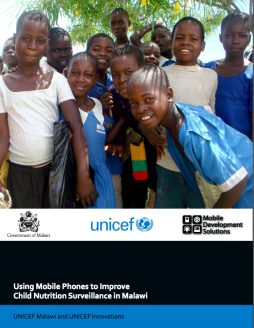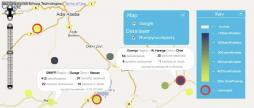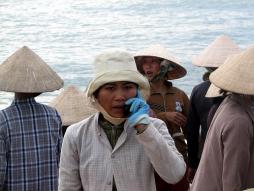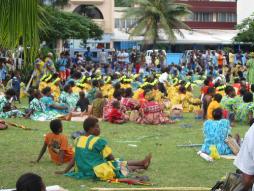Poverty and Hunger
Posted by LeighJaschke on Jul 07, 2009
mHealth for Development: The Opportunity of Mobile Technology for Healthcare in the Developing World data sheet 4749 Views
Abstract:
Mounting interest in the field of mHealth—the provision of health-related services via mobile communications—can be traced to the evolution of several interrelated trends. In many parts of the world, epidemics and a shortage of healthcare workers continue to present grave challenges for governments and health providers. Yet in these same places, the explosive growth of mobile communications over the past decade offers a new hope for the promotion of quality healthcare. Among those who had previously been left behind by the ‘digital divide,’ billions now have access to reliable technology. There is a growing body of evidence that demonstrates the potential of mobile communications to radically improve healthcare services—even in some of the most remote and resource-poor environments.
This report examines issues at the heart of the rapidly evolving intersection of mobile phones and healthcare. It helps the reader to understand mHealth’s scope and implementation across developing regions, the health needs to which mHealth can be applied, and the mHealth applications that promise the greatest impact on heath care initiatives. It also examines building blocks required to make mHealth more widely available through sustainable implementations. Finally, it calls for concerted action to help realize mHealth’s full potential. The report is organized into the following sections:
- 1. Identifying the potential of mobile phones to improve health in the developing world
- 2. Defining mHealth within the context of eHealth
- 3. Meeting health needs through a broad array of mHealth applications
- 4. Examining the impacts of mHealth projects
- 5 Assessing mHealth and future health needs in developing countries
- 6. Identifying the building blocks for sustainable and scalable mHealth programs
- 7. Understanding the incentives for multiple players: mHealth value chains
- 8. A call for action
- 9. Looking forward
- 10. Compendium of mHealth projects
Posted by KatrinVerclas on Jun 20, 2009
Reported by Leigh Jaschke and Melissa Loudon.
This spring, UNICEF Malawi and the UNICEF Innovations Team deployed RapidSMS to monitor child growth and nutrition. We wrote about it previously here.
Now there is a detailed report (pdf), evaluating the effort (pdf). The report, released on June 16th, was issued by Columbia University's School of Public Policy and Affairs (SIPA), UNICEF Malawi, UNICEF's Innovations team, and Mobile Development Solutions (MDS).
The report details the findings of the deployment, and outlines recommendations for the future use of SMS in Malawi. Raymond Short of Mobile Development Solutions says that,
“while there have been innumerable ICT development applications introduced recently, there have not been many independent studies of their efficiency”.
Posted by KatrinVerclas on Dec 21, 2008
Ethopia again this year has experienced crippling droughts. Faced with the possibility of famine, UNICEF Ethiopia launched a massive food distribution program to supply the high-protein food Plumpy'nut to under-nourished children using mobile phones for monitoring and delivering supplies its more than 1,8000 feeding centers in the country.
To coordinate the distribution and maintain appropriate stocks, field monitors reported on supplies and number of children fed through an SMS reporting system using a UNICEF-built mobile data collection and monitoring software, RapidSMS. We have previously reviewed RapidSMS here, comparing it with a less scaleable lower-end tool, Frontline SMS.
The emergency food supply chain before RapidSMS
Posted by KatrinVerclas on Dec 11, 2008
CGAP, one of the leading organizations conducting research and providing leadership in the mobile banking space in the developing world, is holding a live webcast today from 2-5 pm Eastern Time (-5 GMT). Here are the details:
Mobile Banking for Poor People: Pioneer Perspectives
a CGAP roundtable and webinar
Dec. 11, 2008 | 2:00pm – 5:00pm
World Bank Headquarters, Washington DC | online at http://technology.cgap.org
By the end of 2008, the UN says there will be four billion mobile phone connections globally. Millions of air-time resellers and retail agents in developing countries make it possible to distribute financial services at far lower cost than through traditional channels.
Posted by sharakarasic on Nov 01, 2008
On day three of MobileActive ’08, I attended a session led by Pragnya Alekal of the XPrize Foundation. Pragnya is a water sanitation and energy engineer who has spent a lot of time in the field. She stressed that technology has its limitations – it’s not the whole solution. Her entire goal has been to make up for the fact that technology is important while encompassing other factors.
Alekal told us that XPrize’s goal is to revolutionize sectors – they have a commons-based philosophy. Pragnya was at MobileActive ‘08 to get ideas. How do you solve poverty? How do you get more people to think of solutions?
Alekal told us the history of XPrize, which started with a big dream and got scaled out. It was founded by Peter Diamandes – from the age of nine on, he wanted to go to space. He became a rocket scientist and got six degrees. He felt that the astronaut program was too restrictive. If you are non-American like he is, your chances of becoming an astronaut are low. The number of people who make it into space is very small.
Posted by Simon Pavitt on Feb 23, 2008
There's a great article about spread of mobile phones in India and Africa on the BBC News website.
For instance, it mentions how migrant Zimbabwean workers in South Africa send money back using M-banking and avoid having to pay bribes to border guards when they go home.
Posted by KatrinVerclas on Feb 07, 2008
Mobile phones help to decrease the gap between rich and poor nations, and spur economic development, says a UN Report.
In its annual Information Economy Report, UNCTAD, the UN Conference on Trade and Development says that mobile phone subscribers have tripled in developing countries over the last five years, and now make up 58 percent of mobile subscribers worldwide.
"In Africa, where the increase in terms of the number of mobile phone subscribers and penetration has been greatest, this technology can improve the economic life of the population as a whole," the report said.
But while UNCTAD said the revolution in information and communication technology was spreading to the developing world, more had to be done to make sure poorer countries benefited from the opportunities in growth and development.
Africa has seen the greatest rise in mobile use subscriptions have quadrupled since 2001, and last year they hit 200 million - an average of more than 20 cell phones for every 100 people.
Posted by KatrinVerclas on Jan 29, 2008
We are occasionally commissioned to write introductory articles about the mobile revolution and implications for NGOs for various publications. Here is one broad overview of some areas where mobiles are deployed in civil society.
Cellphones have become the most ubiquitous communication device in the hands of human beings. There are an estimated 3.5 billion mobile phones in use and there is coverage in even remote corners of the world. Cellphones have revolutionized not just the way we work and organize within cultures and societies, but have the potential to change how NGOs (non-governmental organizatios) operate.
Mobile phones are already experimentally used in multiple ways by NGOs. We at MobileActive.org have been tracking how organizations in areas such as health and disease prevention, economic development, humanitarian relief, democratic participation, and advocacy are using mobile phones to make their work more effective and efficient.
Following are a few examples of what we have seen and where we think mobile phones have potential to be used more strategically by NGOs.
Posted by KatrinVerclas on Oct 30, 2007
Imagine an industry conference of IP communciations where coders are mashing up an SMS application for a small NGO researching best practices for poverty alleviation. We were curious about what that might look like, so MobileActive.org is at the annual VON conference, the industry gathering of IP communications firms. At its unconference-style Innovation Track, there will be gathering of coders producing an SMS platform for an NGO focused on evaluating poverty alleviation efforts in developing countries. The mashup sponsored by the Thomas Howe Company, a Voice over IP (VOIP) communications firm that focuses on mashups for the enterprise.
We published a recent call for submission of use cases when we first learned about this effort. While typically these kind of 'volunteer coding' projects lack in long-term sustainability and enterprise-level scaling, we are interested in seeing what will become of this mobile text-to-speech platform that will be used in evaluating microfinance loan offerings in the Phillippines and South Africa.
Posted by Bonnie Bogle on Oct 13, 2006
In very exciting news, microcredit pioneer Muhammad Yunas and the Grameen Bank he founded have won this year’s Nobel Peace Prize for their work bringing people out of poverty in Bangladesh. This is a great win for everyone who believes that the path to peace is through ending poverty and that technology can help achieve this.
Yunas came up with the concept of microfinance, which has made it possible for millions of Bangladeshis to rise out of poverty. He has also made great strides in bringing technology to poor areas in Bangladesh, particularly cell phones.
The Grameen Phone initiative uses cell phones for economic development. How it works is that banks give loans so people can purchase mobile phones and in turn rent them out to others in their villages. These phones are often the first access entire villages have to a telephone. Not only do these phones make excellent businesses for the people who manage them, but they also make it possible for everyone in the town to work more efficiently through faster communications. A case study about this program is available here. I’ve also written about it here.
And not surprisingly, access to mobile technology is bringing about the development of innovative new tools to meet Bangladeshi’s specific needs. One example is the service Cell Bazaar, a kind of mobile Craig’s List that people can use to check prices before they buy or sell a product to make sure they are getting the best rate.
Congratulations Yunas and Grameen Bank. Your win is a great achievement for the movement behind using technology for social change, the field of microfinance, and everyone in Bangladesh.
Posted by Bonnie Bogle on Jul 04, 2006
The UN World Food Programme recently received a different kind of text message – a direct plea for help from a refugee in northern Kenya. The message said, “My name is Mohammed Sokor, writing to you from Dagahaley refugee camp in Dadaab. Dear sir, there is an alarming issue here. People are given too few kilogrammes of food. You must help.”
In an article from the UN Refugee Agency about the SMS, reporter Greg Barrow asks what the impact would be if in addition to giving refugees food, the World Food Programme also gave them a few mobile phones and the numbers of all star donors like Bono and Bill Gates. Mohammed’s text message has been making the rounds in the international press so I don’t doubt that similar messages could draw further attention to problems in refugee camps. But I think a greater impact could be made if an organization, like the One Campaign for example, sought out SMS messages like Mohammed’s from people in refugee camps in need of urgent help and sent them to their network. I bet many people who receive such a personal message will want to help, and if they can help by making a small donation from their mobile phone or sending the sms message on to their political representatives, it could spur action to help alleviate problems such as Mohammed’s.
You can read the entire UNHCR article here.



